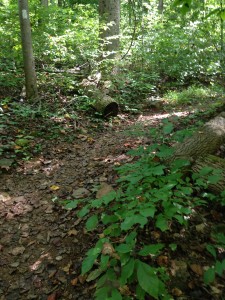what goes up...
 Dear Friends,
I was out hiking by myself on the Appalachian Trail this afternoon, and as I turned to head home I started up a hill. Right away the voice in my head said "ugh, uphill." My mind sprinted from there to calculating all of the remaining uphills on my path. Before I knew it, I was thinking about the time I missed a hiking trip to the grand canyon, which was entirely downhill the first day, and entirely uphill the next... and wouldn't a grand canyon hike be better if it started from inside the canyon? That way the first day would be all uphill and the second day all downhill. Much easier, don't you think? Ignoring the fact that this plan would only work if the hiker lived at the bottom of the canyon, I nodded to myself, yes, yes, that would be much easier. Hikers would get all the difficult hiking out of the way the first day, and enjoy all downhill on their return. Just then, the logical part of my brain kicked in and pointed out that even if one hiked the Grand Canyon up and then down, rather than down and then up, the amount of overall exertion would be exactly the same. Interesting. Then why did it seem to matter?
Dear Friends,
I was out hiking by myself on the Appalachian Trail this afternoon, and as I turned to head home I started up a hill. Right away the voice in my head said "ugh, uphill." My mind sprinted from there to calculating all of the remaining uphills on my path. Before I knew it, I was thinking about the time I missed a hiking trip to the grand canyon, which was entirely downhill the first day, and entirely uphill the next... and wouldn't a grand canyon hike be better if it started from inside the canyon? That way the first day would be all uphill and the second day all downhill. Much easier, don't you think? Ignoring the fact that this plan would only work if the hiker lived at the bottom of the canyon, I nodded to myself, yes, yes, that would be much easier. Hikers would get all the difficult hiking out of the way the first day, and enjoy all downhill on their return. Just then, the logical part of my brain kicked in and pointed out that even if one hiked the Grand Canyon up and then down, rather than down and then up, the amount of overall exertion would be exactly the same. Interesting. Then why did it seem to matter?
As a kid did you ever eat your vegetables first and leave your french fries (or whatever you liked best) for last? Made sense then. But no matter what order we eat the food, the same food is tasted by the same mouth and digested by the same stomach. Walking along a loop trail, the amount of uphill must equal the amount of downhill. What goes up must come down.
And isn't life like that too? Something wonderful happens, and then something difficult, then something we like, then something we don't like. It's a never ending hike in the mountains. The nature of life is that our plate is never just filled with yummy stuff. The reason that we ate the vegetables first is because we knew that if we didn't, we would be worrying about vegetables the entire time we were eating our fries. But why would we do that? Because that's how our human mind is conditioned. As neuroscientist Rick Hanson says, our brains are "like velcro for negative experiences and teflon for positive ones."
Since there is no consequential difference between eating the french fries first or last, it would be helpful if we could train our minds to recognize that. That way, if we eat the vegetables first, we could think, "Well I don't love these, but I will eat them and trust that something better is coming later, it always does." If we eat the french fries first we could enjoy them completely without thinking about all the yukky vegetables we will have to eat later. (note: vegetables are actually quite yummy.)
“Mindfulness is simply being aware of what is happening right now without wishing it were different; enjoying the pleasant without holding on when it changes (which it will); being with the unpleasant without fearing it will always be this way (which it won’t).” ― James Baraz
When we worry about what is coming later, we miss the chance to enjoy the joyful, wonderful moments of our lives. Sure, we may huff and puff when we go up a hill, heck we might not even make it up the next hill, but why waste the joy of the downhill? This downhill moment may be the rest we need in order to conquer the hill around the next corner. It's hard to enjoy the rests when we know that there are so many potential and real struggles to come. But since enjoying them doesn't make the uphill any harder, we might as well go screaming joyfully down the hill, with our mouth full of french fries.
